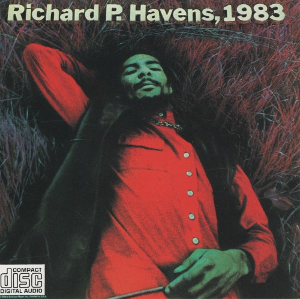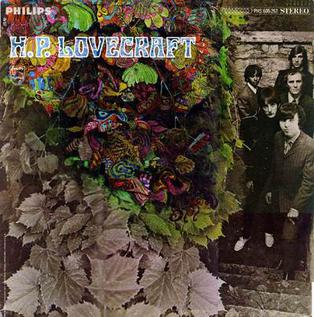Folk rock is a hybrid music genre that combines the elements of folk and rock music, which arose in the United States, Canada, and the United Kingdom in the mid-1960s. In the U.S., folk rock emerged from the folk music revival and the influence that the Beatles and other British Invasion bands had on members of that movement. Performers such as Bob Dylan and the Byrds—several of whose members had earlier played in folk ensembles—attempted to blend the sounds of rock with their pre-existing folk repertoire, adopting the use of electric instrumentation and drums in a way previously discouraged in the U.S. folk community. The term "folk rock" was initially used in the U.S. music press in June 1965 to describe the Byrds' music.

Thomas Harvey "Sean" Bonniwell was an American singer-songwriter/guitarist, who was known as the creative force behind the 1960s garage rock band, The Music Machine.

H. P. Lovecraft was an American psychedelic rock band, formed in Chicago, Illinois, in 1967 and named after the horror writer H. P. Lovecraft. Much of the band's music was possessed of a haunting, eerie ambience, and consisted of material that was inspired by the macabre writings of the author whose name they had adopted. Combining elements of psychedelia and folk rock, the band's sound was marked by the striking vocal harmonies of ex-folk singer George Edwards and the classically trained Dave Michaels. In addition, Michaels' multi-instrumentalist abilities on organ, piano, harpsichord, clarinet and recorder provided the band with a richer sonic palette than many of their contemporaries.

Judith Anne Henske was an American singer and songwriter, once dubbed "the Queen of the Beatniks" by producer Jack Nitzsche. Initially performing in folk clubs in the early 1960s, her performances and recordings embraced blues, jazz, show tunes, and humorous material. Her 1963 recording of "High Flying Bird" was influential on folk-rock, and her 1969 album Farewell Aldebaran, with then-husband Jerry Yester, was an eclectic "fusion of folk music, psychedelia, and arty pop".
Rosebud was the name of an American popular music group which released a single, eponymous album in 1971.

Farewell Aldebaran is a 1969 album by American musicians Judy Henske and Jerry Yester. Originally released on Frank Zappa's Straight record label, it contains an eclectic mix of songs in a wide variety of styles and is also notable for its early use of synthesisers. Allmusic describes the album as "a fusion of folk music, psychedelia, and arty pop, though that only scrapes the surface of the LP's stylistic complexity." Although the album got some good reviews it failed to sell in large quantities, purchasers possibly confused by its eclecticism.

Jerome Alan Yester is an American folk rock musician, record producer, and arranger.

Mixed Bag is the debut studio album by Richie Havens and was released in 1966. Although it was Havens' first album release, Douglas Records later issued two unauthorized albums of material that had been recorded prior to the Mixed Bag recording sessions—Electric Havens (1968) and Richie Havens' Record (1969). Mixed Bag was released after Havens signed on with manager Albert Grossman and was released on Verve Folkways, a new folk music imprint of Verve Records.
Billy Edward "Edd" Wheeler is an American songwriter, performer, writer, and visual artist.
"Stop Messin' Round" is a song first recorded by English blues rock group Fleetwood Mac in 1968. It was written by the group's principal guitarist and singer Peter Green, with an additional credit for manager C.G. Adams. The song is an upbeat 12-bar blues shuffle and is representative of the group's early repertoire of conventional electric blues. The lyrics deal with the common blues theme of the unfaithful lover and share elements with earlier songs.
"The Bells of Rhymney" is a song first recorded by folk singer Pete Seeger, which consists of Seeger's own music accompanying words written by Welsh poet Idris Davies.

Richard P. Havens, 1983 is a 1968 double album set by folk rock musician Richie Havens featuring a combination of studio recordings and live material recorded in concert during July 1968. The album combined original material with several of the covers for which Havens is known. Notable songs include the singles "Stop Pushing and Pulling Me" and "Indian Rope Man", the latter of which has been multiply covered under its own name and in retooled identity as "African Herbsman." The genre-bending album was critically and commercially well-received, reaching #80 on the Billboard "Pop Albums" chart. Initially released on the Verve label, it has been reissued multiple times in various formats, including by Verve subsidiary Verver Forecast/PolyGram and Australian label Raven Records. It has also been compiled with albums Mixed Bag and Something Else Again in multi-cd set Flyin' Bird: The Verve Forecast Years on the Hip-O Select/Universal label.

The Stone Poneys is the debut studio album by the Stone Poneys; other than an early single of "So Fine" that was produced by Mike Curb in 1965, this album marks the first official recordings by Linda Ronstadt.

H. P. Lovecraft is the debut album by the American psychedelic rock band H. P. Lovecraft. It was released in October 1967 by Philips Records.

H. P. Lovecraft II is the second album by the American psychedelic rock band H. P. Lovecraft and was released in September 1968 on Philips Records. As with their debut LP, the album saw the band blending psychedelic and folk rock influences, albeit with a greater emphasis on psychedelia than on their first album. H. P. Lovecraft II failed to sell in sufficient quantities to reach the Billboard Top LPs chart or the UK Albums Chart, despite the band being a popular act on the U.S. psychedelic concert circuit. Legend has it that the album was the first major label release to have been recorded by musicians who were all under the influence of LSD.

"Bluebird" is a song recorded by the American rock group Buffalo Springfield. It was written and produced by Stephen Stills, with co-production by Ahmet Ertegun. In June 1967, Atco Records released it as a single to follow-up their hit "For What It's Worth" (1966).

Make Someone Happy is the second studio album by the folk band We Five released in 1967.

Edward Hoh was an American rock drummer who was active in the 1960s. Although primarily a studio session and touring drummer, Hoh exhibited a degree of originality and showmanship that set him apart and several of his contributions have been singled out for acknowledgment by music critics.
"The White Ship" is a song released by the American psychedelic rock band, H. P. Lovecraft, in November 1967. The songwriting is credited to band members George Edwards, Dave Michaels, and Tony Cavallari. Acting as the opening song on the second side of their debut LP, H. P. Lovecraft, it was the album's longest track, and an edited version was also released as the band's second single. The name and theme of the song derive directly from author H. P. Lovecraft's short story, "The White Ship". Despite its failure to chart nationally, it is widely considered to be H. P. Lovecraft's most accomplished piece, and helped establish the group, who were originally from Chicago, in the West Coast music scene.
The Au Go Go Singers were a nine-member folk group formed in New York City in 1964, and best remembered for featuring Stephen Stills and Richie Furay two years before they formed Buffalo Springfield.













